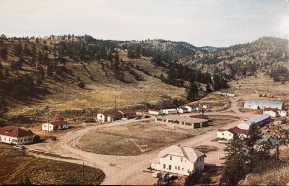
- Details
- By The Nature Conservancy Whitney Preserve
- The Nature Conservancy is seeking former students of the Brainerd Indian Training School, located in Hot Springs, SD. The site of the former school now sits within the boundaries of the Whitney Preserve, currently owned by The Nature Conservancy. The school was operational from 1946-1989.
- We are asking former students, teachers, and staff to share their stories.
- There is not a lot of public information about the school or its history, since it was privately run, and not a governmental school.
- Of special urgency are students who attended the school prior to 1970. Time is of the essence as these former students age.
- If you are formally interviewed for the research, you will be compensated for your time. You may remain anonymous if desired.
Please contact:
LEAD RESEARCHER:
- Rai Combs—Tsimshian (First Nations)
University of Montana Graduate Student 2025
(574) 360-5415
OR
RESEARCH ASSISTANT:
- Laurie Beare—Rosebud Sioux Tribal Member and Brainerd Indian Training School Alumni 1966-1971
(406) 239-2890
The Nature Conservancy
Whitney Preserve
28077 Cascade Road
Hot Springs, SD 57747
Help us defend tribal sovereignty.
At Native News Online, our mission is rooted in telling the stories that strengthen sovereignty and uplift Indigenous voices — not just at year’s end, but every single day.
Because of your generosity last year, we were able to keep our reporters on the ground in tribal communities, at national gatherings and in the halls of Congress — covering the issues that matter most to Indian Country: sovereignty, culture, education, health and economic opportunity.
That support sustained us through a tough year in 2025. Now, as we look to the year ahead, we need your help right now to ensure warrior journalism remains strong — reporting that defends tribal sovereignty, amplifies Native truth, and holds power accountable.
 The stakes couldn't be higher. Your support keeps Native voices heard, Native stories told and Native sovereignty defended.
The stakes couldn't be higher. Your support keeps Native voices heard, Native stories told and Native sovereignty defended.
Stand with Warrior Journalism today.
Levi Rickert (Potawatomi), Editor & Publisher
